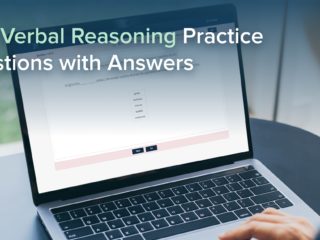| Getting your Trinity Audio player ready... |
Many test-takers deciding whether to sit for the GRE or the GMAT, or switching from one test to the other, wonder, “Is GRE Verbal easier than GMAT Verbal?” It’s a valid question because, while there is a lot of crossover between the two exams’ Verbal sections, there are significant differences that may make Verbal on one exam easier for some test-takers. Furthermore, even in the areas where the two exams’ Verbal sections largely overlap, some key differences may make the GRE Verbal section seem easier or harder than the GMAT Verbal section.
So, in this article, we’ll explore the aspects of Verbal on each exam that may make Verbal easier or harder on one exam or the other. We’ll also answer some common questions related to this topic.
Here are the topics we’ll cover:
- GRE Verbal vs. GMAT Verbal: Structure and Question Types
- GRE Vocabulary
- RC and CR on the GMAT vs. GRE: Similar But Not the Same
- GRE Passages Tend to Be Shorter
- Key Takeaways
- Frequently Asked Questions (FAQ)
- What’s Next?
First, let’s review the section structure and question types you’ll see in GRE vs. GMAT Verbal.
GRE Verbal vs. GMAT Verbal: Structure and Question Types
The GRE presents 2 Verbal Reasoning sections. The first section is 18 minutes long and contains 12 questions, and the second section is 23 minutes long and contains 15 questions. So, in total, you see 27 Verbal questions on the GRE and spend 41 minutes of your exam on Verbal.
The GRE Verbal sections consist of 3 major question types: Text Completion (TC), Sentence Equivalence (SE), and Reading Comprehension (RC).
Text Completion and Sentence Equivalence make up about half of the questions in each Verbal section, with slightly more Text Completion questions than Sentence Equivalence questions.
The other half of the questions in each Verbal section are Reading Comprehension. Those questions include a couple of Critical Reasoning-style questions sometimes known as “Paragraph Argument” questions.
KEY FACT:
There are three question categories on GRE Verbal: Text Completion, Sentence Equivalence, and Reading Comprehension.
Comparison of GRE Verbal to GMAT Verbal
In contrast, the GMAT presents 1 Verbal Reasoning section that is 45 minutes long and contains 23 questions.
Unlike GRE Verbal, GMAT Verbal consists of only two major question types: Reading Comprehension (RC), and Critical Reasoning (CR). You can expect to see 3-4 RC passages that ask a total of about 13 questions. The remaining 10 questions will come from CR.
So, GRE Verbal gives you 4 more questions to answer in 4 fewer minutes. As a result, you have to work more quickly on GRE Verbal than on GMAT Verbal. We have roughly 1.5 minutes per question on GRE Verbal and roughly 2 minutes per question on GMAT Verbal.
Don’t put much stock in the fact that, technically, you have less time to complete GRE Verbal questions. Note that the GRE’s vocabulary-based questions (Text Completion and Sentence Equivalence) questions can generally be answered more quickly than passage-focused questions. So, in this respect, we are comparing GRE apples to GMAT oranges in terms of average time per question. Thus, the more important factor will be which test’s Verbal questions you’re more skilled at answering.
KEY FACT:
Comparison of GRE Verbal and GMAT Verbal regarding question type is difficult.
With that in mind, let’s look at how the various GRE and GMAT Verbal question types compare with each other.
GRE Vocabulary
Historically, the GRE’s vocabulary questions were compared and contrasted with the GMAT’s Sentence correction questions. However, in late 2023, the GMAT revised the Verbal section and deleted Sentence Correction questions.
The consideration now is this: if you have a broad base of vocabulary knowledge already — perhaps you’re an avid reader — then the GRE may be your first choice. Because half of the GRE verbal questions are vocabulary-based, you might earn a higher verbal score percentile by taking the GRE instead of the GMAT.
TTP PRO TIP:
If you are strong in vocabulary, you may find that the Text Completion and Sentence Equivalence questions on the GRE will help you obtain a great Verbal score.
Of course, given the time and effort (and great study materials), you can master GRE vocab. If you can learn word meanings and context clues easily, you might find GRE Verbal is right up your alley.
Consider Both Content and Study Time
One of the challenges of GRE Verbal is the sheer number of vocabulary words test-takers must learn to be prepared for the exam. Even if you have a solid vocabulary base, you’ll likely need to study several hundred vocab words. Some students need to study 1,000 or more.
If you find learning new words a fun challenge, then GRE Verbal may seem doable.
KEY FACT:
For the GRE, you may need to study anywhere from a few hundred to 1,000+ vocab words.
So far it has been a bit of a tossup as to whether GRE Verbal actually is easier than GMAT Verbal. We can see that GRE Verbal and GMAT Verbal are different in some significant ways, but whether that makes Verbal “easier” on one test or the other is largely personal.
So, what about the areas in which GRE and GMAT Verbal are similar? Can we get any further insight into which test is easier there?
RC and CR on the GMAT vs. GRE: Similar But Not the Same
The main similarities between the GRE and GMAT Verbal are Reading Comprehension (RC) and Critical Reasoning (CR). For RC, both exams present passages of varying lengths, accompanied by a series of questions about each passage. For CR, both exams present very short, one-paragraph passages that present an argument that you must evaluate in some way.
On both tests, there is also a lot of overlap in the topics of passages, the question types, and the skills needed to perform well. However, there are a couple of differences that may make the GRE seem easier in these areas.
GRE Passages Tend to Be Shorter
GRE passages are somewhat shorter, on average, than GMAT passages. Yes, you will see a few long passages on the GRE. However, most of the passages you’ll be presented with will be on the shorter side. And what the GMAT considers a “short” passage (roughly 200 to 250 words) generally won’t get as short as a GRE passage could. Many short GRE passages are in the 100-200 word range.
Even CR passages, which are by nature quite short, are often slightly shorter on the GRE than on the GMAT. Now, keep in mind that GMAT CR passages are, in general, already only about 100 words or fewer. However, you’re unlikely to come across a GMAT CR passage that is only 1 or 2 sentences long, while you may see such passages in GRE CR.
KEY FACT:
GRE RC and CR passages are somewhat shorter, on average, than GMAT RC and CR passages.
It’s also important to keep in mind that shorter doesn’t always mean easier. Yes, you may have to spend less time, on average, reading GRE passages. However, even a passage of fewer than 150 words on the GRE can be quite dense, using complex vocabulary and sentence structure.
In fact, GRE passages can employ more literary or lyrical styles that you won’t see on the GMAT. GMAT passages tend to be a bit “dryer” and more “mechanical” in their style and structure.
And we haven’t even touched on the difficulty of the questions associated with a passage. In other words, we can’t assume that because a passage is shorter, the questions about it will be easier.
Nonetheless, shorter passages may make GRE Verbal seem easier than GMAT Verbal to some test-takers.
Shorter doesn’t always equal easier.
The GRE Has Fewer CR Questions
GMAT test-takers often cite Critical Reasoning as the biggest challenge they face in GMAT Verbal. Critical Reasoning questions can be TRICKY and deceptive. And because they make up nearly half of the questions in the GMAT Verbal section, they represent a significant portion of a test-taker’s GMAT Verbal score.
Comparatively, Critical Reasoning questions are de-emphasized on the GRE. They can be just as tough, but you’ll see only 1-2 of them on your entire exam. On the other hand, the GMAT presents about 10 CR questions.
There are also fewer possible types of CR questions on the GRE. Compare the GRE’s 8 CR question types to the GMAT’s 11. So, there are fewer CR concepts to master for the GRE.
For some test-takers, the greater emphasis on Critical Reasoning makes GMAT Verbal more taxing than GRE Verbal. Of course, as with any Verbal question type on either test, with proper preparation, there is no reason any test-taker can’t master GMAT Critical Reasoning!
KEY FACT:
Test-takers face a greater number of CR questions on the GMAT than on the GRE, and they must master a greater variety of CR question types.
So then, assuming that you’re not dead set against studying vocab, is GMAT Verbal harder than GRE Verbal after all? Not so fast. There’s one wrinkle in GRE Verbal questions that we haven’t yet discussed.
The GRE Has Multi-Answer Questions
All of the questions in the GMAT Verbal section are “traditional,” single-answer multiple-choice questions with 5 answer choices to choose from.
The GRE Verbal sections present a variety of multiple-choice questions, including many that require more than one answer or have more (or less) than 5 answer choices.
For example, Sentence Equivalence questions always present 6 answer choices, 2 of which are correct. (You need to select 2 words that produce the same sentence meaning).
Two- and 3-blank Text Completion questions present 3 answer choices per blank. So, a 2-blank question always has 6 choices and 2 correct answers, and a 3-blank question always has 9 choices and 3 correct answers.
In Reading Comprehension, some questions present 3 answer choices and ask you to “select all that apply.” For these questions, there may be 1 or multiple correct answers. It could even be that all of the answers presented are correct.
The thing is, none of the multi-answer questions in the GRE Verbal section allow for partial credit. So, even if you select 1 or 2 of the correct answers to a question, if you don’t select ALL of the correct answers to the question, the question is still marked incorrect.
On the flip side, you’re also likely to see 1 or 2 RC questions on the GRE that ask you to highlight a sentence in the passage. In that case, there are no answer choices to choose from. You simply must base your selection on what the question stem says.
For some students, mastering multi-answer questions and the variety of multiple-choice (or no-choice) questions in GRE Verbal adds to the stress of the exam. On the other hand, the standard, dependable 5-option multiple-choice questions in GMAT Verbal feel more comfortable and predictable.
Key Takeaways
As we’ve seen, there is no clear-cut answer to the question of whether GRE Verbal or GMAT Verbal is easier.
The GRE tests vocabulary, which may be either a blessing or a curse for students.
Reading Comprehension and Critical Reasoning on both exams test your ability to understand many of the same concepts, but the GMAT places much more emphasis on CR than the GRE does.
Not to be outdone, however, the GRE throws a monkey wrench into things by presenting many multi-answer Verbal questions, for which there is no partial credit.
The moral of the story is that whether GRE Verbal or GMAT Verbal is easier is basically a personal judgment that depends on each test-taker’s existing competencies and preferences.
So, what’s the best way to determine whether GRE Verbal or GMAT Verbal is easier for YOU? Try some GRE and GMAT Verbal practice questions. You’ll get a sense of each of the different types of Verbal questions you’ll face on each exam. Do you struggle with Verbal questions from one exam much more than those from the other?
You can also take a free GRE practice test from ets.org and a free GMAT practice test from mba.com. Treat both of those tests like the real deal. Then, compare your results and how you felt when working through Verbal on each.
Whatever you do, don’t take someone else’s word for which test has an easier Verbal section. After all, every test-taker has different abilities. So, while articles like this one can give insight into the particular challenges of each exam, no one can tell you what will be easier for you. Only you can make that determination!
Frequently Asked Questions (FAQ)
Is GRE Verbal Difficult If You Have a Strong Vocabulary?
Although GRE Verbal does heavily test vocabulary knowledge, there is much more to performing well on GRE Verbal than simply knowing the definitions of many words.
For instance, Reading Comprehension questions test your ability to understand a passage. Similarly, Critical Reasoning questions test your ability to analyze an argument.
Even Text Completion and Sentence Equivalence questions, the “vocab-based” questions, test more than just vocabulary knowledge. You also need to use logical reasoning skills and your knowledge of sentence structure and punctuation to master those questions.
So, while GRE Verbal will be considerably less difficult if you have a strong vocabulary, if you don’t master those other skills, GRE Verbal may still be pretty tough.
Is It Possible to Get 170 in Verbal on the GRE?
Yes! In fact, here is a how-to guide on just this topic. The guide contains plenty of practical tips and effective strategies to help any test-taker score 170 on GRE Verbal. Check it out!
And if you aren’t already using the TTP GRE course, you can get a free 5-day full-access trial. Our GRE Verbal and Quant course is customized to your score goal. So, if you’re seeking a Verbal score of 170, our course will give you all of the content, strategies, and practice you need to reach your goal!
Do Business Schools Prefer GRE or GMAT Scores?
If you’re looking into whether GRE Verbal is easier than GMAT Verbal, you may be trying to decide which exam to take. Thus, you may be wondering whether business schools prefer one exam over the other.
While it is still true that the majority of students applying to business school take the GMAT, accepting either GMAT or GRE scores has become the norm for MBA programs. Moreover, schools that accept either GMAT or GRE scores generally view both tests on an equal footing.
Of course, every program is different. So, you should always research each program you’re interested in to see which exams are accepted and whether a preference for a particular exam is stated.
That said, in most cases, you’ll find that you’re able to apply to business schools with either a GRE or GMAT score and that you won’t be at a disadvantage in your admissions chances just because you chose one test or the other.
What’s Next?
Now that we’ve compared GRE vs. GMAT Verbal, you may be interested in our article comparing GRE vs. GMAT Quant.
You also may be interested in our article about whether the GRE is harder than the SAT.
For more guidance on which test to choose, check out our article on the GMAT vs. GRE for MBA programs.
Looking for more personal feedback about your particular situation? Schedule a free, no-risk consultation with a TTP admissions consultant. We’d be happy to discuss your situation with you!



